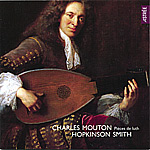This CD is a reissue (Astrée 7728) originally released on LP in 1980 and CD in 1987 and also currently available in a specially priced 5-CD set titled “The 17th Century of Hopkinson Smith” (Naive-Astrée 8816). Not to be confused with the more-often-recorded Franco-Flemish renaissance vocal master Jean Mouton, Charles Mouton’s music is rarely heard on CD, this being the only recording devoted exclusively to him. Stylistically Mouton was heir to the well-established Parisian tradition of Francois Dufaut, Denis Gaultier, and his cousin Ennemond (all of whom Smith has featured in full-length CD programs for Astrée–all unfortunately deleted), where lute composition and performance first attempted to mirror or at least programmatically allude to extra-musical subject matter. Hence, selections here such as “La belle homicide”, “Le Dialogue des graces sur Iris”, “La Bizare”, and the brief self-portrait selection “Le Mouton; Canarie” imply that the composer not only wished to enchant the ear, but also invited listeners to muse over the sources of his inspiration. Whether or not these intended allusions are made, Mouton’s pieces here are always well-crafted, quintessentially elegant, and ceaselessly nostalgic–the anachronistic epitome of late-17th century French style.
Favorite movements include an extended Chaconne that gets progressively complex–imagine an Art of Fugue-like model inextricably woven with left-field counter-melodies and you’ll have an idea. “Le Racommodement; Courante; Double” as well features stunning counterpoint and numerous thematic recapitulations throughout. If the previously mentioned autobiographical “Le Mouton; Canarie” is indicative, Mouton apparently thought himself poised yet dashing, a description reaffirmed by Claude Chauvel’s extensive study in the notes of the painter Francois de Troy’s painting of Mouton reproduced on the booklet cover. Astrée’s presentation and crisp, clear sonics are exemplary as usual. Mouton represented the zenith, if not the last word of lute performance practice and composition before the advent of de Visee and his school. Those who wish a rewarding sampling should rejoice in this reissue. Recommended.
































